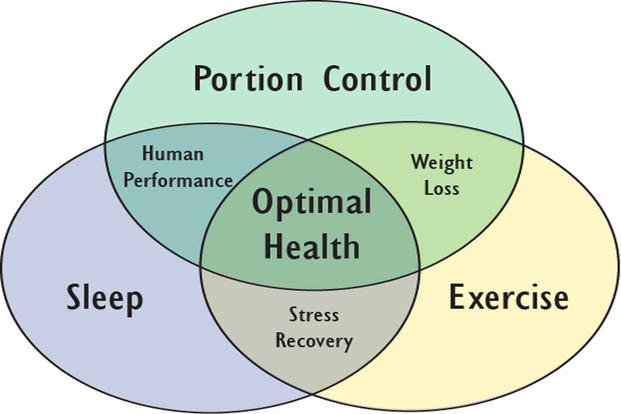Most people struggle to find 30-60 minutes to exercise and usually confuse "too busy" with "not a priority." The biggest challenge of the day is not the hour we try to dedicate to exercise, but the other 23 hours in the day when we fail to sleep properly and consume high-calorie food and drinks.
Failing at the daily process will cause greater stress, an increase in body fat and a tired mind and body that do not "have time" to exercise. To prevent this snowball of lethargy, check out the list of ways to take control of all 24 hours of the day, fit in exercise, control your food intake and get a good night's sleep. The three aspects (exerciser, sleep/nutrition and portion control) have to work together each day for you to be at your best.

The 23/1 Challenge
Weight loss for optimal health. For most people, even avid exercisers, the biggest hurdle of each day is snacking and portion control. If you do not exercise regularly, the challenge is even tougher unless you have a manual labor job or similar activities.
The combination of exercise and portion control is a must, especially as one ages. Once you get into your 30s, 40s, and 50s, you will see that things slow down, but that does not mean you have to stop. You just have to work a little harder and be more disciplined. Because gone are the days when you can "eat whatever you want," work out hard and still lose weight or burn fat at a high rate.
Tips for eating less
- Eat more fruits and vegetables -- nearly half your plate.
- Add protein to every meal. Place fish, chicken or steak on a plate full of salad.
- Get tough. Be more disciplined about eating snacks.
- Add more fiber-rich foods and drink more water all day long.
Though the goal may be weight loss for most, a better term is body composition (lose fat/gain muscle).
Human performance. Whether you are in a tactical profession or have to be on your A-game at a stressful job, the combination of nutritious food and sleep is required. Leave either or both of these out of your daily living, and you quickly will start to feel the long-term and short-term effects of stress. Our energy derives from our food and sleep. We can get them artificially with caffeine and sugar for a short period of time but will hit a big decrease in energy, too. Restorative sleep is required.
- Sleep 6-7 hours a night, eight hours when you can.
- Eat for energy but avoid energy drinks (consume more fruits/vegetables -- less caffeine).
- Avoid caffeine up to six hours before bedtime.
- Blackout room. Keep it cool and quiet (get an eye cover, fan and earplugs if necessary).
- Avoid drinking too much (even water) before bed.
Mental and physical stress recovery. Sleep and exercise are required in combination to help you fully metabolize the catabolic effects of stress. Normal, everyday stress comes in many forms -- from bills you cannot pay, work deadlines, school, family and especially if you are a first responder. In addition to plenty of restful sleep, food can help, too. Proteins, amino acids, antioxidants and omega 3 oils can help you naturally de-stress.
Exercising and breathing more oxygen, even for 20-30 minutes, will result in better health screening numbers. Still, sleep is the No. 1 recovery tool, and if you are not getting enough, stress levels stay high and will limit your ability to burn fat at optimal levels. That's even if you are exercising and controlling your food portions. When in doubt, breathe. Focus on breathing throughout the day; add in an activity that makes you breathe more often (aerobic, anaerobic, resistance training, yoga, walking, etc.).
Tactical Fitness Training Over 40
In the end, it comes down to daily recovery from the previous day's activities, stressors and life challenges. Optimal health requires it, but it also requires physical activity, avoiding junk food and fast food (eat more salads), and finding a way to sleep (and nap, if possible) to help you use the best recovery tool nature has made for us -- sleep. If you have issues with any of the three, it could derail your health eventually and likely your performance immediately.
Want to Learn More About Military Life?
Whether you're thinking of joining the military, looking for fitness and basic training tips, or keeping up with military life and benefits, Military.com has you covered. Subscribe to Military.com to have military news, updates and resources delivered directly to your inbox.
Stew Smith is a former Navy SEAL and fitness author certified as a Strength and Conditioning Specialist (CSCS) with the National Strength and Conditioning Association. Visit his Fitness eBook store if you’re looking to start a workout program to create a healthy lifestyle. Send your fitness questions to stew@stewsmith.com.














